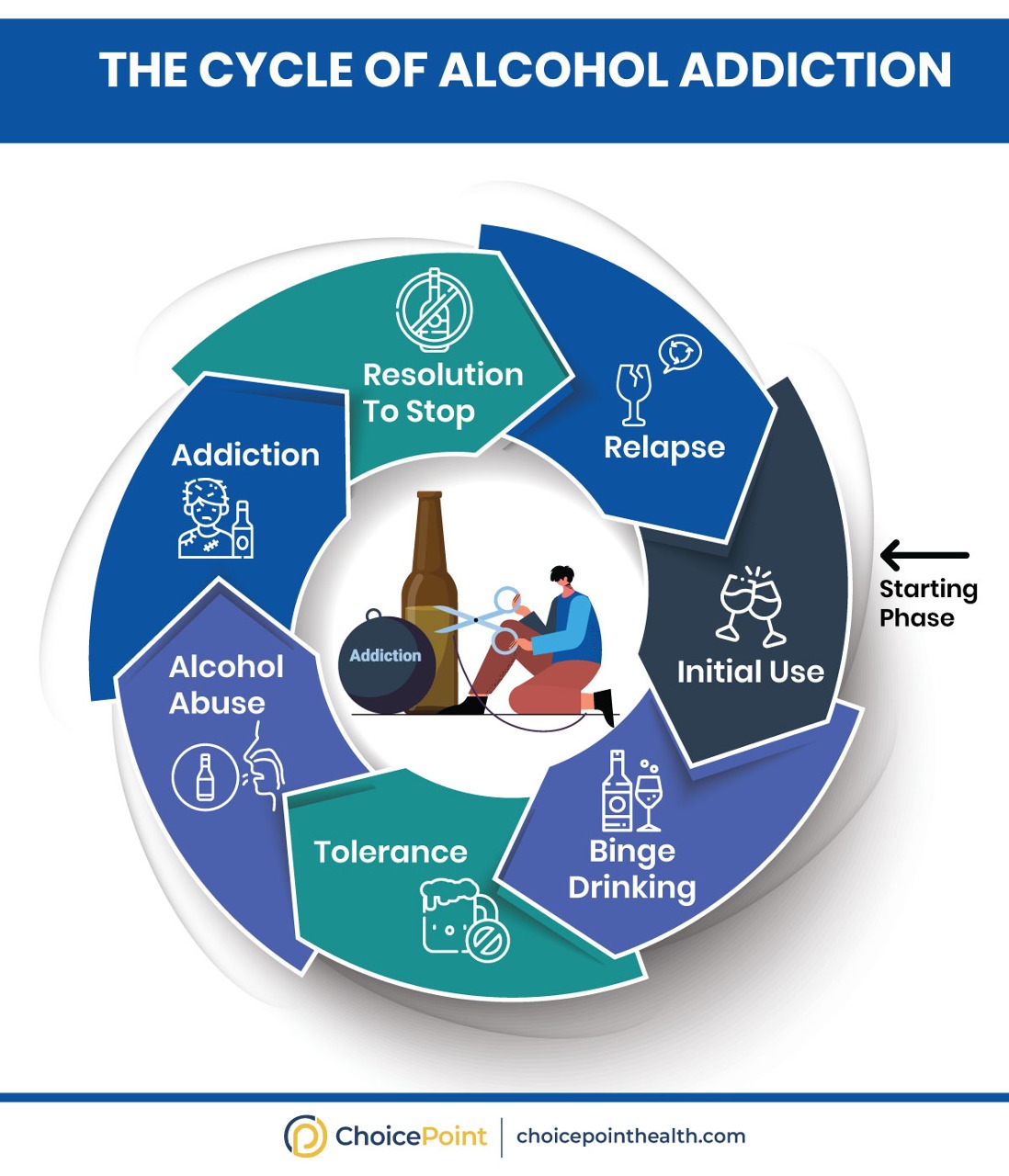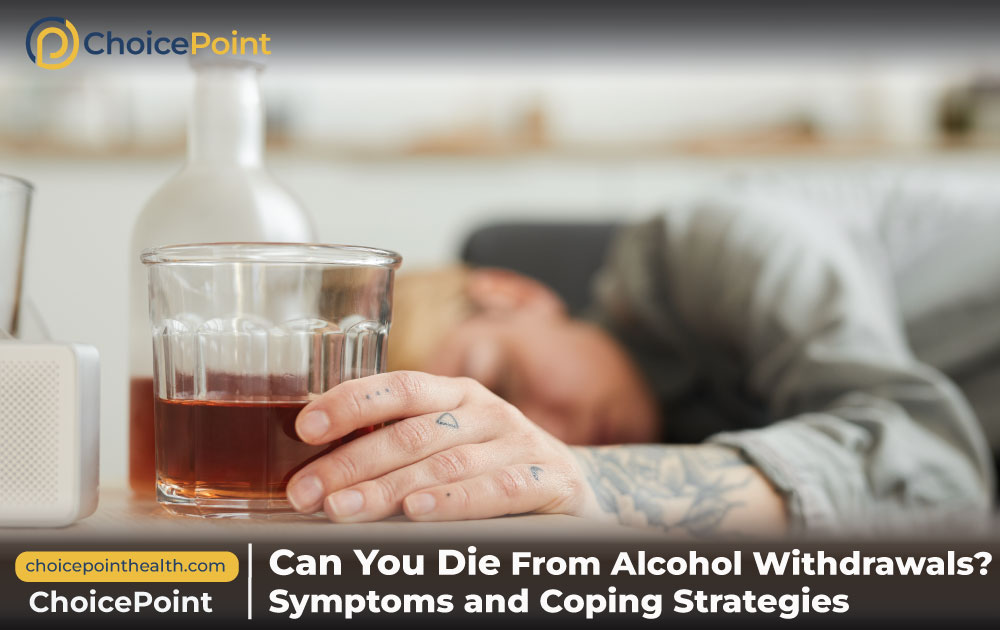Alcohol withdrawal symptoms can range from mild to severe, depending on your condition. Can you die from alcohol withdrawals? It is rare but quite possible. Delirium tremens is a complicated withdrawal symptom that is fatal in nearly 15% of cases without treatment. Read on to learn more about alcohol withdrawals and how to cope with them for a safer recovery.
“It is never too late to be what you might have been!” Recover from alcohol addiction today with ChoicePoint’s personalized alcohol detox programs.
Table of Contents
What Are Alcohol Withdrawal Symptoms?
Alcohol withdrawal symptoms appear when a person reduces or stops taking alcohol after long and frequent consumption. Symptoms may appear after a few hours of alcohol abstinence. This time is very critical as withdrawals peak during this time. If left untreated, these may even become fatal for you.
Alcohol Withdrawal Symptoms Vs. Alcohol Withdrawal Syndrome
Alcohol withdrawal symptoms (AWS) are the signs or conditions a person experiences when they start to cut back on drinking. Whereas alcohol withdrawal syndrome is a set of symptoms a person experiences. In simple terms, if a person experiences more than two AWS, it is classified as alcohol withdrawal syndrome.
Some common alcohol withdrawal symptoms include:
Mild To Moderate Withdrawal Symptoms Of Alcohol
These occur after 12-24 hours of withdrawing from alcohol:
- Headache
- Anxiety
- High blood pressure
- Insomnia
- Hyperreflexia – muscles have overactive reflexes
- Vomiting
- Rapid heart rate
- Confusion
Severe Withdrawal Symptoms of Alcohol
These usually start after 24 hours and may peak during the next 2-3 days. Some of these manifestations include:
- Hallucinations
- Delusions
- Confusion
- Seizures
- Delirium Tremens (DT)
- Paranoia
Find Out If You Are Suffering From Addiction
A quick way to find out if you are suffering from addiction is through addiction self-assessment tests. These tests are medically designed according to DSM-V criteria. Call our confidential helpline 844.445.2563 to discuss the results.
Please note: this assessment is an initial self-screening, and it is not meant to be a medical assessment or clinical diagnosis of addiction. For proper diagnosis and treatment, schedule an appointment with ChoicePoint.
Can You Die From Alcohol Withdrawals? Be Aware Of These Fatal AWS
You might have heard scary things about alcohol withdrawal and now have extreme thoughts, wondering if you can die from alcohol withdrawal. The chances are rare, but severe AWS can be life-threatening. Fortunately, a medically supervised alcohol detox minimizes the risks through early interventions and management. Some fatal alcohol withdrawals that may kill a person include:
Seizures
A person may experience seizures 24 hours after consuming the last drink. Seizures are an uncontrolled activity between brain cells. It causes temporary abnormalities in muscles (jerking and shaking), sensation, and state of awareness. If it is left untreated, it increases the chances of status epilepticus.
Status Epilepticus
Status epilepticus (SE) is a state characterized by continuous seizures that last for more than 30 minutes. SE is an emergency condition that should be treated immediately. Otherwise, it can lead to neurological complications, disability, or death.
Delirium Tremens
Delirium Tremens (DT) is perhaps the most severe and fatal form of alcohol withdrawal.DTs have a mortality rate of 37% if not properly treated. The symptoms appear 2-3 days after the last drink. It is characterized by dangerous symptoms such as:
- Hyperactivity
- Seizures
- Confusion
- Cardiovascular collapse
- Continuous seizures
Warnicke-Korsakoff Syndrome
Warnicke-Korsakoff syndrome, also known as wet brain, is a neurological condition caused by excessive alcohol use. Alcohol disrupts the absorption of vitamin B1, which leads to a wet brain. It is a rare, life-threatening condition. It can lead to:
- Respiratory distress
- Unconsciousness
- Coma
- Death

The Stages of Alcohol Dependence
Can You Die Without Alcohol? Who Is At The Risk Of Severe Withdrawal?
It may feel like you are dying without alcohol, but in reality, cutting back on drinking will prolong your life. Some individuals may experience more intense AWS than others. Here are some individuals who are at a greater risk of life-threatening withdrawal:
- People who indulge in heavy drinking daily.
- Who have previously undergone detox but relapsed.
- History of generalized seizures.
- Bad liver health or suffering from liver disease.
- People who have any underlying psychiatric condition.
If you or someone you know is at risk of severe withdrawal, please encourage them to seek timely help. You can safely withdraw from alcohol under the care of licensed practitioners. Call today at 844.445.2563.
Dangers Of Self-Medication And Alcohol Withdrawal
To ease the withdrawal symptoms, some people often self-medicate or take opioid-based medication to alleviate pain. However, taking certain medications with alcohol can lead to life-threatening conditions. Here is a brief overview:
| Drugs | Consequences of Mixing With Alcohol |
| Suboxone | Increased risk of overdose, liver damage, and respiratory depression. |
| Hydrocodone | Unconsciousness, impaired thinking, and risk of overdose, which may lead to coma and seizures. |
| Tramadol | Increased sedation and drowsiness, which may lead to unconsciousness |
| Xanax | Increased risk of liver damage, impaired cognitive function, respiratory distress, and risk of overdose |
| Melatonin | Excessive drowsiness, which may lead to fainting and unconsciousness. |
| Diflucan | Do not take Diflucan with alcohol if you are suffering from liver or kidney disease. |
Why Does Withdrawal Occur? Latest Research Regarding Alcohol Withdrawals
Moving forward from can alcohol withdrawals kill you, let us address a common concern. Are withdrawal symptoms inevitable? If you have a history of alcohol abuse, chances are you will face withdrawal symptoms.
The mechanism of AWS is as follows:
- Small molecules, neurotransmitters, carry messages between our brain and body.
- These neurotransmitters can be inhibitory (produces relaxation, depressing your central nervous system (CNS) or excitatory (stimulates the CNS)
- Regular alcohol intake disrupts the balance between inhibitory (GABA) and excitatory neurotransmitters (Dopamine).
- The body adjusts its functioning and begins to depend on alcohol for normal functioning.
- When a person stops using alcohol, the central nervous system goes through a hard time adapting to the lack of alcohol.
- This leads to a series of reactions in the body, causing AWS.
We are with you and understand that withdrawal sounds scary and intimidating. However, many researchers now suggest that supervised treatment makes the symptoms manageable.
Here are the insights from the latest research:
- More than 90% of seizures related to AWS occur within 48 hours. However, 3% may occur as late as 20 days. Making it essential for patients to commit to the full course of treatment.
- Similarly, DT is 15% fatal in cases without treatment and only 1% fatal in those who receive treatment.
How To Prevent Death From Alcohol Withdrawals?
Medical alcohol detox is the safest way to recover from alcohol addiction and associated complications. Alcohol detox is usually carried out in an inpatient setting under the supervision of a licensed clinical team.
Alcohol Withdrawal Management
The first week of quitting alcohol is probably the hardest. The withdrawal symptoms peak during this time. Medical supervision is of utmost importance during this stage. Proper treatment during the withdrawal phase helps to minimize the chances of seizures and DT.
Your treatment may include a combination of medications and counseling to manage AW (alcohol withdrawals). Some of these medications include:
- Naltrexone: Helps to reduce alcohol cravings
- Acamprosate: Helps restore normal brain functioning in people who have heavily abused this drug.
- Disulfiram: Produce uncomfortable symptoms after consumption to discourage alcohol use.
- Antidepressants: These may be prescribed to relieve anxiety and depression.
- Anti-seizure medications May be prescribed if you have a history of seizures.
Furthermore, you will be encouraged to enroll in a therapy program and counseling to address the psychiatric symptoms associated with AW. After detox, you may still experience Post-Acute Withdrawals or PAWs. These symptoms are best managed through behavioral therapy.
Managing Alcohol Post-Acute Withdrawal (PAWs) With Behavioral Therapy
You may still experience Post-Acute Withdrawals or PAWs after detox. These symptoms appear because the brain adjusts to the absence of alcohol. PAWs can last up to 2 years or longer after the last drink. Common post-acute withdrawals include:
- Depression
- Anxiety
- Insomnia
- Impaired concentration
- Fatigue
- Poor memory
PAWs are best managed through behavioral therapy as these are mostly psychological. Some behavioral therapies that are beneficial for substance abuse treatment include:
- Cognitive behavioral therapy
- Dialectical behavioral therapy
- Individual therapy
- Group therapy
- Family therapy
Furthermore, dual diagnosis is a great program to treat both alcohol addiction and associated mental health problems.
In Conclusion: Can You Die From Alcohol Withdrawals?
Well, Alcohol withdrawal is a risky process. Though generally safe, death during alcohol withdrawal is a rare possibility. We recommend you not take any chances and recover with the best team of doctors and healthcare practitioners at ChoicePoint.
Our team understands the challenges and risks associated with alcohol detox. Years of experience and diverse clientele have helped us to incorporate the best strategies to detox from alcohol.
Some highlights of our alcohol detox program in NJ include:
- Virtual support and counseling.
- Inpatient and outpatient levels of care are offered depending on the patient’s needs and convenience.
- Solid aftercare plans to prevent PAWs and relapse.
- Most insurance is accepted, including Medicare, Medicaid, and Tricare.
Step into a brighter and healthier future with ChoicePoint! Book your appointment today by calling us at 844.445.2563.
More Questions Related To Can Alcohol Withdrawal Kill You?
Some further questions related to can you die from alcohol withdrawals are answered below:
How Do You Prevent Alcohol Withdrawal Symptoms?
It might not be possible to prevent alcohol withdrawal symptoms completely. However, these symptoms can be minimized through medications prescribed at medical detox centers. Some medications that can ease withdrawal symptoms include:
- Antidepressants
- Naltrexone
- Disulfiram
- Acamprosate
What Is The First Sign Of Alcohol Withdrawal?
One of the first signs of alcohol withdrawal include:
- Cravings
- Headache
- Insomnia
- Tremors
- Difficulty in concentrating
How Do I Feel Better During Detox?
Some mind-refreshing activities to feel better during detox include:
- Reconnect with nature
- Hydrate
- Mindfulness meditation
- Yoga
- Adapt a new habit
- Get plenty of sleep
Does Everyone Get Withdrawal Symptoms?
You may not experience withdrawal symptoms if you are suffering from mild addiction or you are a casual drinker.
What Is The Most Serious Form Of Withdrawal?
Delirium Tremens (DT) is the most serious form of alcohol withdrawal. A person may die if DT is left untreated.
Medical Disclaimer:
ChoicePoint aims to improve the quality of life for people struggling with substance use disorder and mental health issues. Our team of licensed medical professionals research, edit and review the content before publishing. However, this information is not intended to be a substitute for professional medical advice, diagnosis, or treatment. For medical advice please consult your physicians or ChoicePoint's qualified staff.











Review Can You Die From Alcohol Withdrawals? Symptoms And Coping Strategies.